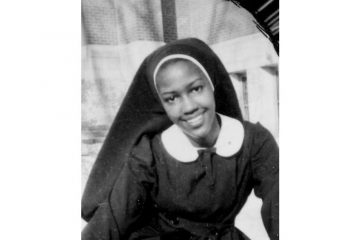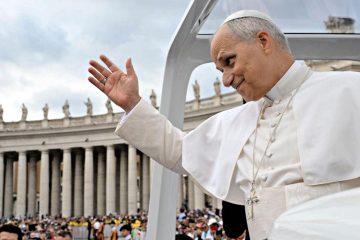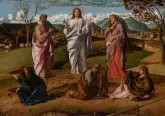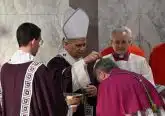The Catholic Moment: What Keeps Me Catholic? Interpreting Scripture
June 22, 2011
By Michael Daley
It was not without a little fear and trembling that I approached writing this recent column. In fact, if the truth be told, I didn’t think I’d make it. Preacher Harold Camping had predicted the end of the world this past May 21. His calculation was based upon years of reading the Bible using mathematics to interpret hidden prophecies.
Thankfully, it didn’t happen. A very Catholic and sane scriptural response won the day instead: “But of that day and hour no one knows, neither the angels of heaven, nor the Son, but the Father alone” (Matthew 24:36). Like the Boy Scouts, when it comes to the end of the world, the Catholic tradition hedges its bets and says: “Be prepared.” Your end is more likely to come before the end.
Speaking of another end, especially with all the rain that fell this spring, the Creation Museum in Northern Kentucky is planning on constructing a water park themed after Noah’s Ark and the flood. This brought to mind a story that I’d heard some years ago: A Sunday school teacher asked her young class how Noah spent his time in the ark. When there was no response, she asked, “Do you suppose he did a lot of fishing?”
In response, a six-year old piped up, “What, with only two worms?”
Both of these scenarios — end time prophecies and Noah’s Ark water parks — are quite foreign to Catholic ears. It’s not the way we interpret and/or “sell” Scripture. And, as a result, it’s one of the things that keep me Catholic.
Rather than say, “God said it. I believe it. That settles it,” Catholics reply, “That’s not the half of it.” Countering the centuries old charge that Catholics don’t read the bible, scriptural reading and biblical literacy are regarded as key foundations for a Catholic’s faith life today. This was stressed through the Second Vatican Council’s “Constitution on Divine Revelation” (Dei Verbum).
As important as reading the Bible is, though, it may be more important how we do it. When approaching the Bible, it is important to recognize that it is a collection of books written over an extended period of time to a diverse group of people.
One key interpretive tool when reading Scripture is to know the literary form. Creation stories of Genesis (myth) are different from Job (debate), which is different from Mark (Gospel). Knowing this goes a long way in beginning to understand what God is attempting to reveal to us through Scripture — “the Word of God in the words of humans.” Ultimately, Scripture is most concerned about revealing religious truth to believers, not scientific or historical fact.
Another crucial tool is appreciating the historical context of what we’re reading. This considers the practices and beliefs at the time the book was written, which are often very different than our own today. Knowing what a passage meant in the past, what the original author intended, better enables us to apply it to our lives today.
Taken together then these two keys help Catholics avoid the pitfall of fundamentalism or an overemphasis on the literal wording of Scripture divorced from its literary form, cultural context, and the teaching of the church community. As a result when it comes to scriptural interpretation, Catholics share great sympathy with Mark Twain who once said, “It ain’t those parts of the Bible that I can’t understand that bother me; it is the parts that I do understand.”
Interpreting the Bible contextually, critically, for spiritual development — it’s what keeps me Catholic.
Daley is a freelance writer and teacher at St. Xavier High School.













